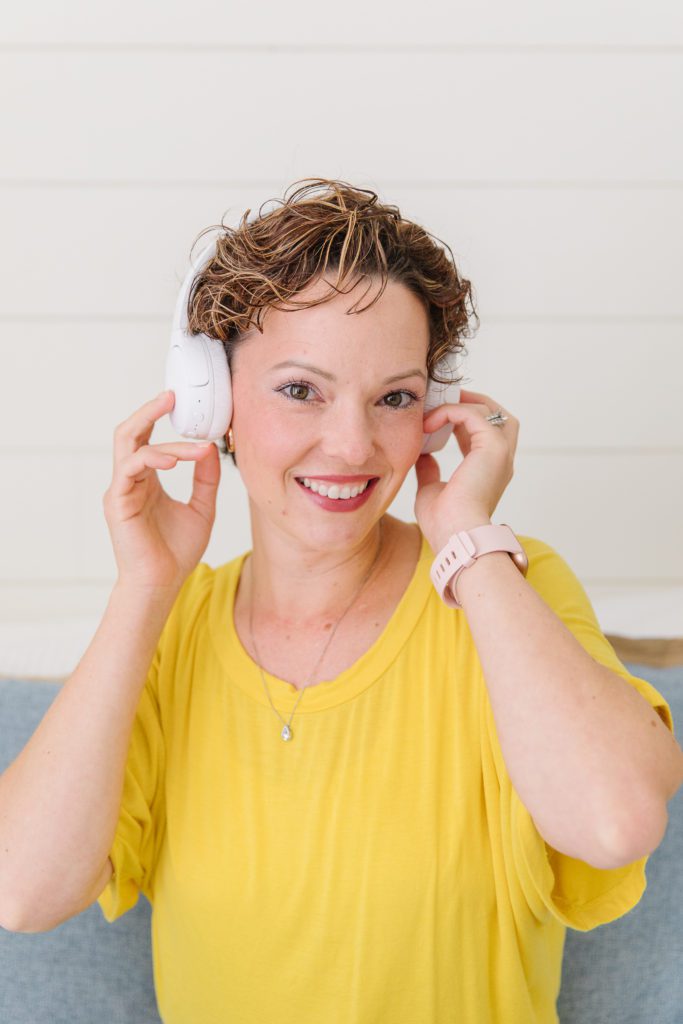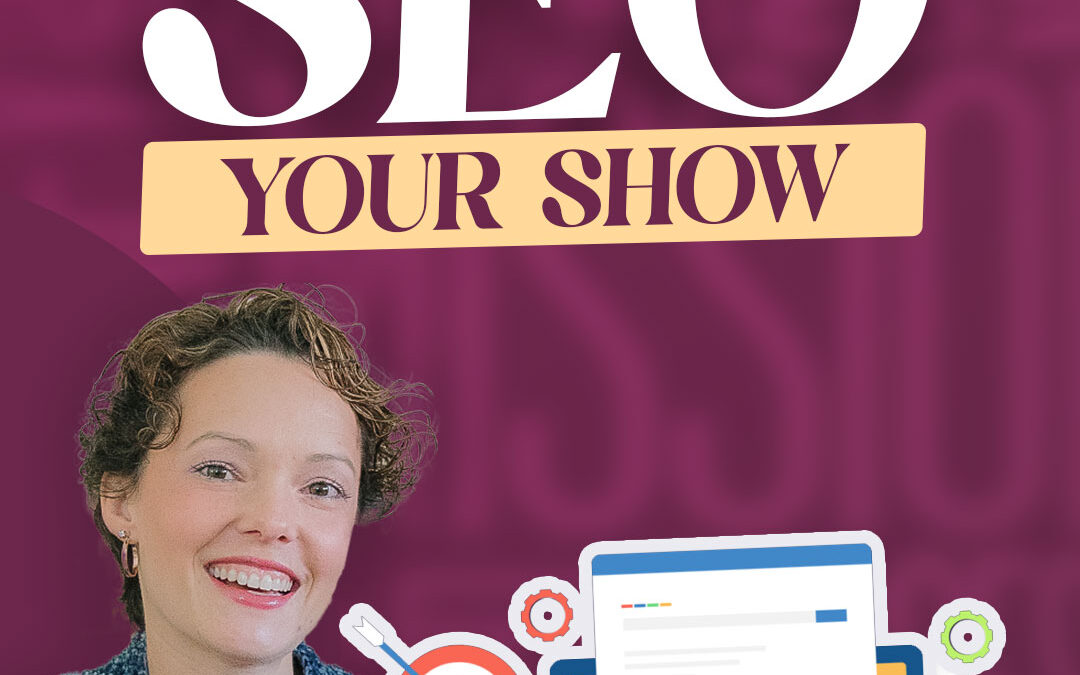10 Mistakes Preventing Podcast Growth
You know what they say: “Build it, and they will come!” Well, I’m sorry to break this to you but when it comes to podcasts, that’s NOT necessarily the case!
If you’re in that limbo space where you’ve started a new podcast and you’ve recorded some amazing podcast episodes, but you’re hearing crickets, this article is for you. Your traction is non-existent, and it’s possible you’re getting frustrated and thinking about quitting.
DON’T QUIT before you TRY THIS

Chances are you just need to make some minor tweaks to your podcast growth strategy (or implement one!), and your podcast audience will explode with new listeners!
You already know that having your own podcast helps build your audience (because you’re a smart cookie), and you know that it’s an amazing way to share your message with the world and build your brand. But right now, you’re in kind of a slump; you’re feeling like you’re putting in hours of effort, and the payoff just isn’t worth it. And it’s no wonder if you’re grinding away and you’ve still only got 30 followers (and one of those is your mom!)
But it doesn’t have to be that way — you don’t have to feel victim to the algorithm — With a little time and effort, you can boost your podcast follower numbers and create a show that helps you connect with your ideal audience.

So many new podcast hosts I speak to are struggling to create a successful podcast, and when I listen to their shows, I can often identify the key problems straight away. So, let’s dive into the ten reasons your show isn’t growing so you can dig back through your podcast episodes to figure out which changes you need to make to help your show get on its way to topping the podcast charts in your niche.
Growing a Podcast: 10 Mistakes That Are Holding Your Show Back
Mistake #1: Not Defining Your Target Podcast Audience
One of the foundational steps in any content creation process, be it a blog post, article, video production, or podcast episode, is understanding who you’re speaking to. Your target audience for your podcast and business is the compass that guides your content direction, tone, and even the topics you cover. If you don’t define who you want your podcast listeners to be, it can lead to a scattered approach, making it difficult for listeners to resonate with your show, thus making it hard for you to build a loyal following.
How to Avoid This Mistake:
- Research: Use online surveys or social polls to gather insights about your ideal podcast listeners’ lives. Find out their age, profession, interests, aspirations, and what they hope to gain from your podcast – this is what will help you speak to them directly, present solutions to challenges they face, grow your podcast audience, and attract more podcast listeners.
- Ask for Feedback: Regularly get feedback from your audience. This can be done by collecting their email address in exchange for free tips or PDFs and, in return, encouraging them to hit reply! Another method is to encourage listeners to connect with you via social media. Some podcasters find engagement with their followers through Q&A sessions (inspired by DMs they’ve received) at the end of episodes. Audience feedback will provide some really great insights into what they love, what they want more of, and areas of improvement.
Mistake #2: An Inconsistent Publishing Schedule
While I hate the word “Consistency,” it is key to at least appear consistent to potential clients. In the world of content creation (podcasting is no exception), your listeners/viewers expect new episodes on a regular basis, and if you don’t deliver, they quickly lose interest.
Podcast listeners integrate listening to their podcast app or watching your YouTube episodes as part of their routine – every time they drive to work, do dishes, fold laundry, or walk the dog, and maybe during all of those activities. So, when your podcast community expects your new episode to be available, and it’s not, they’ll find something else to listen to. This is why an inconsistent publishing schedule can be one of the quickest ways to lose listeners and slow the growth of your podcast.
How to Avoid This Mistake:
- Plan Ahead: Create a content calendar for your podcast. Outline topics, pick an excellent podcast guest for each topic, and schedule recording dates well in advance. This helps you ditch the stress around “OMG, what am I going to talk about this week?” and ensures you produce consistently. The exercise of creating a content plan forces you to think ahead and ensures plenty of time for research and preparation.
- Batch Recording: Record multiple episodes in one sitting. Book interviews with only a 15 minute break in between for outfit changes, refreshments, and a potty break. If you’re recording solo episodes, have multiple scripts/outlines/topics ready to go! When you record 3 episodes in a single block of time every two weeks, you’ll end up with 6 episodes per month when there are only 4-5 weeks in each month. This “in the bag” content can allow you vacation time, less stressful busy seasons in your business, or to simply have a day off!
- Set Clear Expectations: Let your listeners know if you’re taking a break or changing your publishing schedule! You’re human too; sometimes your listeners like being reminded of that. Tell them that you’re bumping from a weekly show to every-other-week or that this season is coming to an end but next season starts in 2 months. Whatever adjustment you need to make your podcast sustainable over the long term, keep them informed – grow your podcast audience by letting them IN so they can experience the journey with you.
- Use Scheduling Tools: Podcast hosting platforms allow you to schedule a new episode in advance. Take advantage of this to ensure that your newest episode drops even if you’re unavailable. For example, my team and I schedule clients’ episodes to go live at 5 a.m. on their desired day. No one on my team is up at 5 a.m. pushing that episode live! Everything is recorded, edited, and posted to the podcast’s RSS feed days or even weeks in advance.
Mistake #3: Poor Sound Quality
In podcasting, unsurprisingly, audio is everything, and your show needs to provide loyal listeners with a good-quality audio experience. Listeners are more likely to tune out or skip episodes if they struggle to hear or understand what’s being said. Ensuring crisp, clear sound free of P pops, background noise, and echo (i.e., reverb) is exceedingly important to keeping your audience engaged and growing your podcast.
How to Avoid This Mistake:
- Invest in Good Equipment: While you don’t need to break the bank, investing in a decent microphone can make a world of difference. I highly suggest you buy a SamsonQ2U because of its low price, high-quality sound, and simple plug-and-play features. The other recommendation I have is NOT to buy a dang Blue Yeti. I don’t know what kind of amazing marketing they did to get influencers to sing their praises, but they are not for home-office recordings! Thoroughly research microphone features that fit your budget and needs.
- Learn Basic Audio Editing: Familiarize yourself with basic audio editing techniques or invest in the services of an amazing podcast editor. Software like Audacity (free) can help you clean up background noise, improve clarity, make simple cuts, and enhance the overall sound of your podcast. Another user-friendly favorite of mine for independent podcasters is Descript. It requires a subscription payment but provides helpful features like Studio Sound and can help you produce branded audio, video, and social media pieces.
- Choose a Quiet Recording Environment: Reduce background noises like traffic, air conditioning, your computer fan, the dog snoring, or the neighbor’s lawn crew. Find a quiet time and space to record and consider using sound treatment on nearby hard surfaces to prevent hard-to-remove reverb in your audio.
- Test and Adjust: Before recording a full episode, record a few audio files to check for any issues. It’s always a great idea to listen back to your own audio and watch samples of your own videos to see or hear areas for improvement. Avoid being overly critical and only pause to make adjustments to things you can control- microphone placement, volume levels, and software settings are a few. Not liking the tone of your own voice or being conscious about your weight or hair is not to prevent you from moving forward.
Mistake #4: Not Telling People Where to Find Your Show
Creating a podcast is only half the battle; getting it in front of potential listeners is the other half! Many new podcasters believe that listeners will naturally find them if they produce great content. But without promotion, your podcast can get lost in the sea of available content (there are about 2 million podcasts out there!), making it difficult for potential listeners to discover your show. Believe it or not, most people don’t talk about their business enough, and as a result, over half of the people you know probably don’t even know what you do!
How to Avoid This Mistake:
- Drive Listeners to Your Podcast Website: Every podcast needs a podcast website, period. You need a platform you own where people can find each new episode, whether or not Apple Podcasts, Spotify, or Amazon exists tomorrow. The only exception to this rule is if you already have a website for your business – if so, don’t launch an entirely new podcast website. Simply add a podcast tab or add your podcast page under a Resources drop-down on your existing business website.
- Get Active on Social Media: Create profiles for your business on popular social platforms if you haven’t already done so. If you have a business account and the podcast is your marketing arm, your podcast content should easily intertwine with what you’ve already been posting about your services/products/happy clients. Share episode snippets, your podcast trailer, quote cards, guest bio spotlights, and behind-the-scenes content. Then, answer questions, engage with your audience, and make sure your followers can easily find the link to your website.
- Collaborate with Other Podcasters: Whether you want to be a guest or you’re looking for guests, guest appearances can introduce your podcast to new audiences. A solid growth strategy includes guest invitation or pitch email templates, posts on your social media channels about your interviews and interviewees, email marketing content so subscribers are notified about your guest(ing) episode, and pre-made social media posts for your guests to share on their social media channels.
- Optimize for Search: Ensure that your website, podcast title, description, and episode titles are SEO-friendly. When you’re writing each set of episode show notes, think about what your target audience will type in Google when they’re looking for this episode. Include key phrases and commonly asked questions in the first paragraph of your episode description to increase the likelihood that potential listeners to find you through search engines.
- Encourage Reviews and Ratings: Ask your listeners to leave reviews and ratings on platforms like Apple podcasts, Google podcasts, and other podcast apps. Positive reviews can grow your podcast audience and increase your credibility. One cool way to participate in and win more integrity-based listens and reviews for your show is by participating in PodLottery. It’s quite fun!
Mistake #5: Not Engaging with Your Audience
Podcasting is all about communication. While it may seem like a one-way street, with the host speaking and the audience listening, the most successful podcasts foster a two-way relationship with the podcast audience. Engaging and talking with your audience can transform passive listeners into active community members, amplifying the reach and impact of your podcast and attracting new listeners.
How to Avoid This Mistake:
- Active Presence on Dedicated Social Media Accounts: Use your YouTube channel, podcast directories, and social media profiles not just for promotion but also for engagement. Respond to comments, participate in discussions, and create interactive content like polls or Q&A sessions to get the word out about your show.
- Celebrate Podcast Milestones: Celebrate podcast milestones with your audience, like episode anniversaries or listener count achievements. Do throwback posts to re-highlight and tag excellent guests to help them celebrate current milestones in their lives and businesses. This gives you a sense of shared accomplishment you can connect over.
- Personal Touch: Whenever possible, add a bit of a personal touch to your interactions. Whether it’s a handwritten thank-you note to a dedicated patron or a shout-out to a long-time listener, these little touches can make a big difference in getting your podcast heard by more listeners.
Mistake #6: Overloading with Your Show with Ads
Ads and sponsorships can provide the financial support needed to keep your show on the road, but you need to make sure they don’t detract from the listener experience. Overloading your episodes with too many ads or poorly placed sponsorships can turn the podcast community off. Constant interruptions from ads can break the flow of an episode, making it hard for listeners to stay engaged. If listeners feel bombarded by ads, they might look for other podcasts that offer a more seamless listening experience.
How to Avoid This Mistake:
- Limit Ad Duration: Keep your ads concise. Long-winded promotions can definitely test a listener’s patience!
- Choose Relevant Sponsors: Only partner with brands or products that align with your podcast’s theme and your audience’s interests. This makes the ads feel more like valuable content rather than interruptions.
- Share About Your Business: If you have an existing business and the podcast is related to your services or products, then the ads in your show should highlight your services/products! When an ad is tastefully positioned in the first 20% of your episode and comes off as a helpful solution, it doesn’t feel like an ad.
Mistake #7: Not Having a Defined Niche
With the podcasting landscape becoming busier than ever, standing out from the crowd of other podcasts is vital. So many new podcasters jump into the scene without a clear understanding of what sets their show apart. Without a unique value proposition (UVP), your podcast can easily get lost in the crowd.
How to Avoid This Mistake:
- Leverage Your Strengths: What are you particularly good at or passionate about? Whether it’s your expertise, unique perspective, or interviewing style, lean into your strengths. For example, my podcast production services are worth the extra money to clients because they know I provide attention to detail in carrying out their vision and voice while freeing up their time and mental space.
- Research Competing Podcasts: Listen critically to other podcasts in your niche. Discover what they do well and what you’d improve upon – take what you like, tweak what you don’t, and implement those features into your podcast. Understand what they offer and identify gaps or areas you can approach differently.
- Consistently Communicate Your UVP: Whether it’s in your podcast branding, promotional materials, email marketing, or your various social media posts and profiles, consistently communicate what sets your podcast apart from everyone else listed in the same podcast directories.
- Stay Updated and Evolve: The podcasting world is dynamic. New opportunities to grow your podcast via ad space, platform-specific promo swaps, and social posts always pop up. Regularly revisit your UVP to ensure it remains relevant and distinctive as the landscape changes.
Mistake #8: Ignoring Analytics and Metrics
Without analytics, you’re essentially guessing what works and what doesn’t. This can lead to misguided content decisions and wasted effort. You need to get to know the analytics section of your podcast host account so you can keep track of which episodes resonate most with your audience, allowing you to create more of what they love.
How to Avoid This Mistake:
- Familiarize Yourself with Key Metrics: I’ve said it before and I’ll say it again – podcast stats generally suck. There’s not yet a clear way for you to determine how many subscribers you really have. Regardless, do your best to understand basic podcast metrics such as episode download numbers, listener demographics, episode retention rates, and source of traffic.
- Use Dedicated Analytics Platforms: Many of your podcast apps and hosting platforms offer built-in analytics. The metrics in your Spotify account or YouTube channel likely won’t match those you find in your host account. That’s because your host account (my top recs are Libsyn, Captivate, or Buzzsprout) measures listens based on your RSS feed, while the other apps only measure listens on their platform. Get comfortable using these tools and review your metrics regularly.
- A/B Testing: Consider experimenting with different episode formats, promotion strategies, or release times. Use analytics to gauge the effectiveness of these experiments.
Mistake #9: Underestimating the Importance of Show Notes
Well-structured and keyword-rich show notes can improve your podcast SEO, making it easier for potential listeners to find your content through search engines. They provide your audience with additional resources, references, or a call-to-action that can drive listener engagement. They are also helpful in making your show accessible to listeners who might be hearing-impaired or those who prefer reading over listening.
How to Avoid This Mistake:
- Structure is Key: Organize your episode notes in a clear and logical manner. Your podcast show notes should include a brief summary, followed by key points discussed, resources mentioned, and any calls to action. *Snag this template.
- Incorporate Keywords: Think about the terms potential listeners might use to search for what they want. Using those phrases in your episode descriptions will increase the likelihood that your content will show up in their search results!
- Provide Additional Resources: Whether it’s links to articles, books, tools, or other relevant content, enrich your show notes with resources that add value to the listener’s experience.
- Promote Engagement: Flip portions of your script into questions to encourage listener interaction. Prompt them to sign up for a newsletter, DM you, or follow your social media profiles.
Mistake #10: Not Investing in Your Learning and Development
The initial learning curve of starting a show might seem steep for new podcasters, but you can’t stop educating yourself once you have the basics covered. Relying on outdated methods or technologies can lead to a stagnant podcast that fails to resonate with modern audiences.
Resources for Staying Updated with Trends, Techniques, and Technologies:
- Podcasting Webinars and Workshops: Regularly attend industry webinars and workshops. These can provide insights into the latest trends and best practices. Attend this one for FREE!
- Industry Blogs and Magazines: Publications like Podnews, The Podcast Host, and Inside Podcasting offer valuable articles and updates focusing on the industry.
- Podcasting Conferences: Events like Podcast Movement or Podfest Expo bring together industry experts and offer sessions on a range of topics, from content creation to marketing workflow and monetization strategies.
- Podcast Communities: Join Facebook groups, podcasting forums, Google podcasts, Apple podcasts or Reddit communities. Engaging with fellow podcasters can give you invaluable insights, feedback, and recommendations on the latest tools and techniques.
Creating a Successful Podcast Can Change Your Life/Business
If you already have an existing podcast, register for a podcast audit to find out what changes should be made to connect better with your target listener/potential customer and avoid these ten common mistakes that may be hindering your podcast growth now.
Podcasting isn’t a route to overnight success, but it is a powerful medium for starting an important conversation with your community or engaging with crucial topics in your industry.
Remember, no matter how popular it is today, every podcast started with a single episode and a handful of listeners. Growth takes time, patience, and consistent effort. But with dedication, a commitment to learning, and a genuine passion for your content, success is not just possible—it’s probable.
To launch your podcast as your business’ primary marketing arm and avoid the above mistakes from the beginning, book a call with me today. I’m here to guide you step-by-step through equipment dilemmas, over software hurdles, and around the real and perceived roadblocks most business owners face.

Written by Virginia Elder
More From This Category

How to Name Your Podcast: Identify the Gap in Your Industry | Bri Conn | Ep 54
What if you niched down so far that you only served a very specific, small sub-set of the population? That’s exactly what Jay Zigmont and Bri Conn did when they established the Childfree Wealth® podcast and brand. Both of them saw a gap in the traditional CFP...

How To SEO Your Show: Making It Easy for Ideal Clients to Find Your Podcast | Ep 52
Learn the exact SEO strategies we use to help our podcast clients get found. You’ll find out how to tweak the written content around your podcast to make any algorithm display your content to your potential clients. Listen for tips to create the best titles, include...

Podcasting: A Powerful Post-Conference Follow-Up Tool
SUMMARY: Podcasting is a great way to follow up with people you meet at conferences. By creating podcast episodes about conference topics and sharing them with your new contacts, you can stay connected, build trust, and turn those connections into clients. Watch the...
0 Comments
Affiliate Disclosure: Happy Healthy Abundance, LLC dba Podcast Abundance is a participant in affiliate link programs and may accept payment from sponsors as a way to provide you with products, courses, and programs that I love, and may include items from Amazon and any other programs or products I believe will provide benefit you. Affiliate links are located throughout this website. The links provide a small percentage of commission to Happy Healthy Abundance at no additional cost to you. Affiliates and Sponsors have been carefully selected with integrity and I’ll never promote anything or accept sponsorship for a product or course or from a company that I don’t believe will actually improve your life and help you in your journey toward abundance.

0 Comments